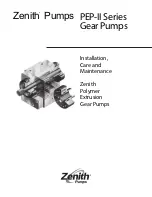
4
existence of the safety appliances
before you start the machine.
Do not attempt operation in this
case, protect the machine by
unplugging the mains cord.
Remove all loose clothing and
confine long hair.
Before operating the machine,
remove tie, rings, watches, other
jewellery, and roll up sleeves above
the elbows.
Wear safety shoes; never wear
leisure shoes or sandals.
Always wear the approved working
outfit
Always wear ear protection when
operating a table saw.
- safety goggles
- ear protection
- dust protection
Do
not
wear gloves while operating
this machine.
For the safe handling of sawblades
wear work gloves.
Observe the chapter “save operation”
in this manual.
Check the correct rotation of the
sawblade before operating the
machine.
Do not start cutting operation until
sawblade is at full speed.
Control the stopping time of the
machine, it may not be longer than
10 seconds.
Do not use side pressure to stop
rotating blade.
Insure that the work piece does not
roll when cutting round pieces.
Use suitable table extensions and
supporting aids for difficult to handle
workpieces.
Always hold and guide the
workpieces safely during machining.
Pay particular attention to
instructions on reducing the risk of
kickback.
The supplied raving knife must
always be used. Adjust the space to
the sawblade to be max 5mm.
Do not perform any operation for
which the tool has not been designed
for, e.g. do not use this table saw to
cut logs or firewood.
Do not perform any operation
freehand.
Never reach around or over the saw
blade.
When ripping narrow workpieces
(smaller than 120mm) use as push-
stick or push-wood.
Push stick or push wood must stay
with the machine when tool is stored
and not in use.
Always use the mitre gauge for
cutting off.
The use of dado-blades and groove
cutters is not permissible.
Make sure that small cut off
workpieces will not be caught and
thrown away by the rising saw blade
teeth.
Remove cut and jammed workpieces
only when motor is turned off and the
machine is at a complete standstill.
Install the machine so that there is
sufficient space for safe operation
and work piece handling.
Keep the inside of the cabinet clear
of sawdust and wood chips. Make
sure the motor fan and fan cover are
kept clear of sawdust.
Keep work area well lighted.
The machine is designed to operate
in closed rooms and must be placed
stable on firm and levelled ground.
Make sure that the power cord does
not impede work and cause people to
trip.
Never use the power cord to carry
the tool.
Do not expose the power cord to
heat, oil or any sharp corners.
Do not pull the cord to unplug.
Keep the floor around the machine
clean and free of scrap material, oil
and grease.
Stay alert!
Give your work undivided attention.
Use common sense.
Keep an ergonomic body position.
Maintain a balanced stance at all
times.
Pull the mains plug if the tool is not
in use.
Pull the mains plug prior to any
maintenance or change of accessory
(e.g. sawblade).
Before starting the machine make
sure that operating and measuring
tools are removed from the machine.
Do not operate the machine when
you are tired.
Do not operate the machine under
the influence of drugs, alcohol or any
medication. Be aware that
medication can change your
behaviour.
Keep children and visitors a safe
distance from the work area.
Never reach into the machine while it
is operating or running down.
Never leave a running machine
unattended. Before you leave the
workplace switch off the machine.
Do not operate the electric tool near
inflammable liquids or gases.
Observe the fire fighting and fire alert
options, for example the fire
extinguisher operation and place.
Do not use the machine in a dump
environment and do not expose it to
rain.
Wood dust is explosive and can also
represent a risk to health.
Dust form some tropical woods in
particular, and from hardwoods like
beach and oak, is classified as a
carcinogenic substance.
Always use a suitable dust extraction
device
Before machining, remove any nails
and other foreign bodies from the
work piece.
Specifications regarding the
maximum or minimum size of the
work piece must be observed.
Cut thin or thin-walled work-piece
only with fine-toothed saw blades.
Never cut several work-pieces at the
same time – and also no bundles
containing several individual pieces.
Risk of personal injury if individual
pieces are caught by the saw blade
uncontrolled.
When cutting round stock, use a
suitable jig to prevent the work-piece
from turning.
Never cut work-pieces containing the
following materials:
-Ropes, strings, cords, cables and
wires.
Do not force the power tool. It will do
a better and safer job and give you
much better service if it is used at the
rate for which it was designed.
Do not remove chips and work piece
parts until the machine is at a
complete standstill.
Never operate with the guards not in
place – serious risk of injury!
Do not stand on the machine.
Connection and repair work on the
electrical installation may be carried
out by a qualified electrician only.

























